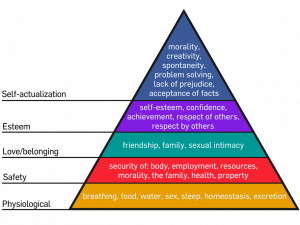Part Two: What Do We Belong To?

This part of the book will consider the various institutions, groups, clubs, etc., that we claim membership in: the things we belong to.
The desire to belong with others, also known as belongingness, can take many forms such as the need to belong with a group of our peers at school, to be part of a team or club, to be included in a group at work, or to be part of a cultural or religious group. Feeling like you know your place and your tribe is a human trait: we need to align with and be accepted by members of a group.
Feeling like we belong is more than just being acquainted with others. It depends on acceptance, approval, and attention from the group as well as providing the same to others.
This need to belong can lead us to modify our behaviors, beliefs, and attitudes in order to conform norms of the desired group. We consider changing our appearance, and sometimes, we might even change our values in order to achieve the belonging we desperately crave.
What motivates us to seek our tribe? In many cases, the need to belong comes from sharing some point of commonality. For example, when we find those who like the same kind of clothing, style of music, and other interests might seek each other out to form friendships. Other factors that can lead individuals to seek out groups include:
- Cultural interests
- Religious beliefs
- Shared goals
- Work/career path
- Socioeconomic status
- Race/ethnicity
In Abraham Maslow’s hierarchy of needs, belongingness is part of one of his major needs that motivate human behavior. The hierarchy is usually portrayed as a pyramid, with more basic needs at the base (food, water, etc.) and more complex needs (morality, creativity, etc.) near the peak. The need for love and belonging lie at the center of the pyramid, part of the social needs of humans.

By belonging to a group, we feel as if we are a part of something bigger and more important than ourselves – this can help us find a greater sense of purpose for our lives. We may, for example, find a sense of belonging and purpose in our chosen career path or in having and raising a family. Sometimes we get to choose how we belong or what groups we belong to. Some of these choices are made for us. Understanding where we belong – and where we want to belong – is important to understanding something fundamental about our human experience.
